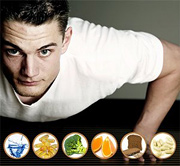To Your Health
April, 2007 (Vol. 01, Issue 04) |
|
|
Nutrition for Athletes
Back to Basics
By Michael Dobbins, DC
True or false: I often receive calls from my patients asking, "Doc, what about taking creatine? Should I?" (true) or "What about the powdered entrails of the Mongolian muskrat? Have you seen the studies?" (not so true), and so on. The point is, everyone wants magic. The retail stores, infomercials, magazines, the Web, and endless unsolicited e-mails all promote hundreds of "performance enhancement" products that look good on paper - or at least the models in the ads certainly look good. It is so easy to fall into a trap.
Ponder this: If anything other than food, air and water were necessary to obtain and maintain human health, you would not be reading this article and there would be no magazine. In fact, there would be few humans around. We have not historically had "super" foods or "super" supplements. Yet any review of human history shows us that, in general, people of the not-too-distant past were considerably more robust, more athletic and leaner than the average American today. Review the incredible research of Dr. Weston Price, as recorded in his book Nutrition and Physical Degeneration, and you will see the negative physical effects on primitive societies when "modern" food and eating patterns are introduced. Perhaps a "back- to-basics" or at least a "back-to-traditional" diet plan is a more sane approach.
 What then shall you, the athlete, eat? Our ancestors made protein and fat the base of their food pyramid. Oh, I know, there was this one tribe on this one island that ate only popcorn or some such thing, but even if that really did happen, it wasn't the norm for most of humanity. How interesting to consider that in the natural food supply, the high-protein foods that were so basic were also high in good saturated fats. Good saturated fats, our only truly efficient source of fat-soluble vitamins such as A and E, and another factor that Dr. Price called "Factor X," are necessary for proper mineralization of bones. Contrary to what is commonly believed, current literature seems to indicate that the higher the protein intake for humans, the better the whole-body bone density. How interesting, once again, that the traditional diet so neatly provided all that was needed.
What then shall you, the athlete, eat? Our ancestors made protein and fat the base of their food pyramid. Oh, I know, there was this one tribe on this one island that ate only popcorn or some such thing, but even if that really did happen, it wasn't the norm for most of humanity. How interesting to consider that in the natural food supply, the high-protein foods that were so basic were also high in good saturated fats. Good saturated fats, our only truly efficient source of fat-soluble vitamins such as A and E, and another factor that Dr. Price called "Factor X," are necessary for proper mineralization of bones. Contrary to what is commonly believed, current literature seems to indicate that the higher the protein intake for humans, the better the whole-body bone density. How interesting, once again, that the traditional diet so neatly provided all that was needed.
How then can I assist you, the athlete, the "wanna-be" athlete or the weekend warrior, in your quest? Other than the dietary changes referenced above, I recommend you take a few fundamental whole-food supplements to make certain you are receiving the nutrients you need before, during and after exercise. Certain whole-food supplements provide nutritional support for joints, proper muscle function (lactic acid distribution) and cardiovascular function (adequate oxygenation for the increased demand). Diet is the critical factor, but changing your diet takes time. You need to provide your body with the essential nutrients in the most efficient way while that change is taking place.

